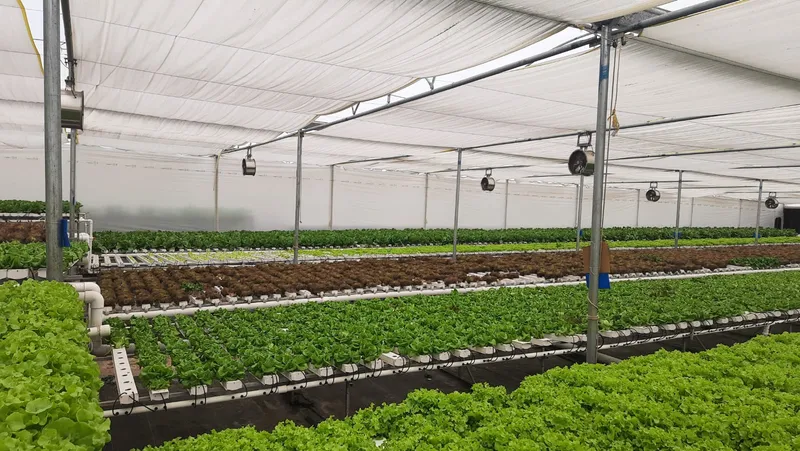From farm to fork, Nutrifresh takes hydroponically-grown produce to customers' doorstep
Pune-based agritech startup Nutrifresh sells hydroponically-grown fruits and vegetables. It controls the entire production—right from seed procurement to delivery.
Is organic produce really ‘organic’? While India leads Asia in growing organic food across 23 lakh hectares of land, the word ‘organic’ is not protected in the country—leading to widespread and sometimes unverified use.
The doubt germinated in the minds of Sanket Mehta and Ganesh Nikam. The duo had known each other since 2012-13 and built a strong rapport when Ganesh met Sanket, who was working as a credit manager at the Central Bank of India in Pune, for a few agri-financing-related proposals.
They came across the soilless cultivation method of hydroponic farming. Hydroponics, which is a Latin word meaning “working water,” grows produce by exposing their roots directly to a nutrient-rich water solution. This technique allows the plant to absorb all the required nutrients directly from the water.
“It is more controlled, precise, and traceable," remarks Sanket in a conversation with YourStory.
In 2019, the duo came together to found agritech startup , with the idea of providing healthy, pesticide-free, and residue-free food to consumers at large. The Pune-based startup uses hydroponic techniques (soilless cultivation) to grow produce.
The founders bootstrapped the startup with an initial investment of Rs 1 lakh from personal savings.
How does it work?
Nutrifresh’s hydroponic farms use a controlled environment with the help of polyhouses and insect nets. The air is supplied in controlled measures, water is RO-purified, and nutrients are water-soluble.
The entire production is controlled—right from the procurement of high-quality seeds from the US and Israel, nursery, germination, harvesting, packaging, and delivery of the produce to the end-user. The startup claims that the entire supply chain from—farm to fork—takes less than 24 hours, and has minimal or no human involvement.
According to Sanket, the controlled environment and precision farming have significantly reduced the farms’ reliance on monsoon.
Nutrifresh employs the use of fertigation—supplying dissolved fertilisers to crops through a drip irrigation system. When combined with an efficient irrigation system, both nutrients and water can be managed to obtain the maximum possible yield of marketable production from a given quantity of these inputs.
The startup began with four acres of land, and has since expanded to 28 acres in Pune. Hydroponic farming is operational on 20 acres, with the remaining land expected to be in use by December this year. It grows and sells 42 SKUs of fruits and vegetables such as tomatoes, butterhead lettuce, arugula, zucchini, European cucumber, Italian basil, Hass avocado, and blueberries, among others.
"Initially, growing crops as per market requirements was a challenge as it used to change every season. But after a yearlong study, it became smoother," says Sanket, Co-founder of Nutrifresh.
The land is operated by the 200-membered Nutrifresh team itself.
"All post-harvest practices are done by the Nutrifresh team, and they are not outsourced. For these reasons, Nutrifresh has been able to achieve superior quality and freshness," he adds.
The business
NutriFresh operates on both B2B and B2C models.
The startup supplies produce to over 100 aggregators, including new-age trade aggregators and delivery partners like Nature’s Basket, Bigbasket, Instamart, Vista Foods (McDonald’s), Supr Daily, Kissan Konnect, and Hyperpure, among others.
It serves around 15,000 users and has a weekly active user base of 1,000 users. It claims to receive around 100 orders daily.
Customers can place orders via app, website, and surprisingly, Google Forms.
"We started the B2C business during the lockdown and we never thought that we would get a great response, so we used Google Forms. To date, the maximum number of orders that we’ve received are from Google Forms," Sanket explains.
Nutrifresh has tied up with and for deliveries, while it also owns five tempos. The startup charges a delivery fee of Rs 50 for orders under Rs 250, and waives it off for higher transactions. It adds that the cost of the produce is, on average, 1.5 times higher than the market prices.
To minimise the cost of logistics, B2C deliveries only take place on Wednesday and Saturday.
The B2B business accounts for 85% of the startup’s revenue, with the remaining 15% coming from B2C.
Nutrifresh generated Rs 8.74 crore from operations (sales) in FY21, and Rs 27.72 crore in FY22.

NutriFresh Farms
As a localised P2P marketing initiative, the startup has tied up with ‘Tigress Moms’, a community of 10,000 women across Mumbai and Pune, to promote healthy lifestyles and healthy food. NutriFresh offers 10-15% commission per order value to the women.
"We have formed a mom-centric distribution network to encourage women entrepreneurship and advocate for a healthy lifestyle for moms of today," he adds.
Farmers
Presently, Nutrifresh works with around 150 farmers, and women comprise over 90% of its workforce. The startup aims to skill them in modern techniques and help them achieve complete self-sustenance.
The farmers undergo a training module to skill them with modern techniques and achieve complete self-sustenance before the startup onboards them onto the platform. NutriFresh pays farmers a monthly wage as per MGNREGA guidelines. It also offers them pick-up and drop-off services.
The startup has multiple accreditations, including from ISO (International Organisation for Standardisation), HACCP (Hazard Analysis Critical Control Points), FSSAI (Food Safety and Standards Authority of India), and APEDA (Agricultural and Processed food products Export Development Authority). It also follows Global GAP—the internationally recognised standards for farm production.
Market and competition
According to IMARC, the Indian agriculture industry was worth Rs 71,220 billion in 2021, and is expected to reach Rs 1,42,280 billion by 2027, growing at a CAGR (Compound Annual Growth Rate) of 12.3% during 2022-2027.
The global hydroponic market size was valued at $2.1 billion in 2020, and is expected to grow at a CAGR of 20.7% from 2021-2028, as per Grand View Research. Though still nascent, the Indian hydroponic market is expected to grow at a CAGR of 13.53% between 2020-2027, according to DataM Intelligence.
In May 2022, Nutrifresh raised $5 million in a Pre-Series A round from global investors to scale-up farm operations, implement complete traceability and transparency of products for marketing, and create an integrated farmtech platform.
The startup is in talks with investors to raise another round by January 2023. It competes with Simply Fresh.
Nutrifresh plans to expand its operations by adding another 80 acres of land in Pune in a DOCO (dealer-owned company operated) model, where 60% of the profit from the produce will be shared with the owners of the land. It is in the process of onboarding two dealers, with 7 acres and 8 acres of land each.
Edited by Kanishk Singh







